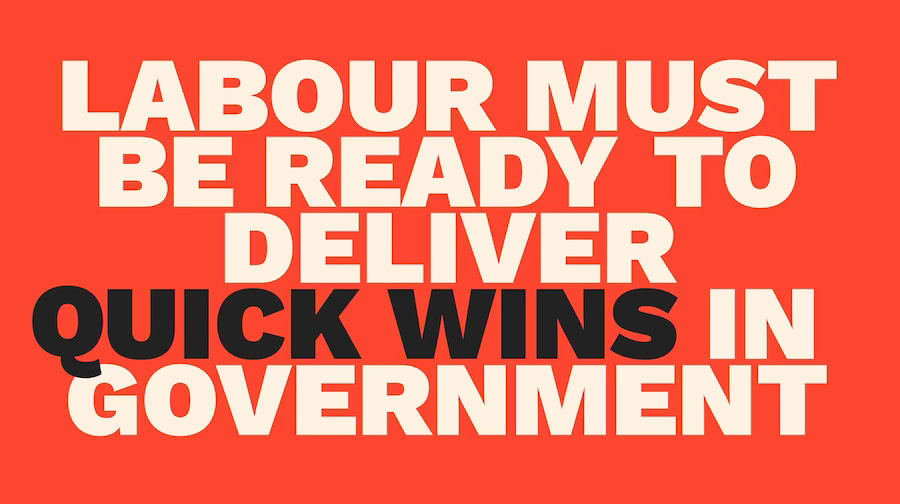Labour must be ready to deliver quick wins in government
Keir Starmer warned to be prepared to make swift progress, or face the unpopularity and rejecting striking centre-left governments across the world
On last week’s podcast, Labour was warned it must be ready to deliver quick wins in government to avoid the unpopularity facing centre-left governments across the world.
Beyond the glitter of his conference speech, Keir Starmer needs to ensure that Labour in government will be ready to demonstrate tangible traction on the “basic necessities” such as NHS waiting lists to avoid the fate of unpopularity and rejection facing centre-left governments around the world, including in New Zealand, Australia and Germany.
In a special episode of The Power Test recorded live at Labour Party conference, Sam Freedman and Ayesha Hazarika were joined by POLITCO chief Anne McElvoy, Tony Blair’s former political director John McTernan and former Ed Miliband speechwriter Marc Stears who said it was imperative Labour would be able to show that it could “turn things around”.
“If you win, people are going to expect a turnaround. People are in an extremely difficult situation at the moment when it comes to the basic necessities of life. They are going to look to a new government, if there is one, to turn those things around. Working out from now to the election how Labour can ensure it has some quick wins, but also establishes long-term transformation, is the key challenge.”
Marc Stears, The Power Test ‘Beyond The Glitter’
The warning came just days before the Labor government in New Zealand was ejected from office, a major referendum offered by Australian Prime Minister Anthony Albanese was rejected and losses piled up for the governing German coalition in regional elections.
“If you look around the world, what has happened in the last few years is pretty good election victories for centre-left parties such as Germany and Australia on an agenda looking fairly similar to the one Keir Starmer plans to put to the British people next year. But then you also see those governments falling out of favour remarkably rapidly. Anthony Albanese looks like he will lose a major referendum on the indigenous voice in Australia and the German government is in real trouble with people saying it hasn’t delivered upon its agenda for working people. Boldness is therefore not a political strategy, it’s an economic and social necessity.”
Sam also laid out the challenge facing Labour was one of delivering real change in tough times, commenting that:
“There’s also a sense Labour are playing with small announcements because they don’t have very much money and can’t talk about more money because of the tax situation. But when it comes to it, and people are expecting something to happen, whilst realistically it’s not only about money somehow they are going to have to find a lot more money.”
Whilst Tory rhetoric is unlikely to help the government overcome its record, Labour must avoid setting up false dichotomies by claiming it can solve the country’s problems through ‘radical reform’ without spending a penny. Particularly with a £28bn commitment already on the table.
On that McTernan argued that the party’s pledges on health and the environment were “bigger than 1997” and resembled a bold agenda for change.
But, with the Rutherglen and Hamilton West by-election spelling further trouble for the SNP, and potentially indicating a haul of seats helping push Keir Starmer over the line into Number 10, Hazarika and McElroy also pointed out that Labour will face a key early-term electoral test in the shape of the 2026 Scottish elections. The panel commented that “stability and reassurance” and a longer-term 10 year plan must be coupled with showing clear signals of progress by delivering key pledges - including ending the tax breaks on private schools to create funding for key spending pledges.
The conversation also focused on how Labour still needs to translate its missions into normal everyday language as part of a “convincing retail offer” for the election. But that Labour should continue to heed the warning from several key figures - including Peter Mandelson - and avoid alienating people by overpromising and setting itself up to fail to deliver. The party must continue to create space for it to govern by “branding the Conservatives as the party that created the mess” at every opportunity, including as McTernan argues and laid out by Rachel Reeves in her conference speech, setting up investigations into the scale of the disoder left by the Tories, ensuring that whilst taking on the mantle of change, Labour can avoid the trap of taking on too much responsibility too quickly, given that not everything will be solved immediately - an approach which previous led to David Cameron delivering a majority for the Conservatives in 2015.
We’re also delighted to say that our episode this week will focus on the politics of net-zero; who pays and how does Labour deliver on a £28bn pledge to fire up the economy?
You can contact The Power Test on pod@thepowertest.co.uk or message us on X (if we’re calling it that yet) @thepowertest.





